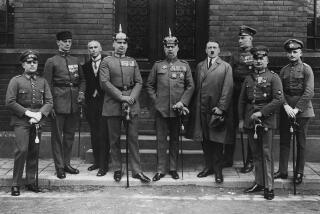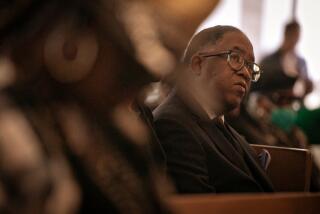Media : Responding to Ridley: The View of British Press
- Share via
Nicholas Ridley, one of Prime Minister Margaret Thatcher’s senior Cabinet members, sparked a furor late last week when he was quoted in a published interview as comparing the European Community to Adolf Hitler, accusing the French leadership of “behaving like poodles” on a German leash, and branding the move toward European economic union “a German racket designed to take over the whole of Europe.”
Ridley, 61, Britain’s minister for trade and industry, subsequently apologized for the remarks he made to The Spectator magazine and “unreservedly” withdrew them. Thatcher at first resisted calls to fire her errant adviser, but later accepted his resignation. But the next day, portions of a leaked, high-level government memo were published referring to a meeting at her Chequers retreat and listing “aggressiveness” and “bullying” as defects in the German national character.
At heart, the flap reflects a long-standing controversy over German unification and fears Britain will lose control over its own destiny in what it sees as the rush toward a more truly united--and possibly, German dominated--Europe. And the British press, always enlivened by a good political squabble, leaped to the editorial ramparts.
“Imagine in 1939 sending your life savings to Herr Adolf Hitler. And letting him spend the whole caboodle on champagne, caviar, gifts to greedy farmers, and financiers in cigar-smoked rooms.
“Well, you wouldn’t, would you?
“Trade Secretary Nicholas Ridley yesterday spelt out, rather more bluntly than was good for him, the fears of millions of Britons when we all become European in 1992.
“In his Parliamentary career, Mr. Ridley has generally exhibited the brainpower of a bowl of cold sauerkraut. Yesterday he talked a lot of sense.”
--The Daily Star , Friday, July 13
“Do we wish to live with the old stereotypes which have kept us going for so long? If so, if we wish to continue to insist that the Germans are the beastly Hun and the French the tricky frogs, then we must face up to that quite honestly. For we can never be part of a broader European entity, whatever the politicians may say, if our hearts and minds refuse to make the Channel crossing.
“In our view, that would be a great tragedy. It is, indeed, amazing how deeply pessimistic are people like Nicholas Ridley about Britain’s ability to once again establish itself as a powerful economic force in Europe and the world. German economic supremacy is not a fact of life which, like a law of nature, is immutable . . .
“If we want Britain to enter the next century with a great future as well as a past, we need to start now by defining the kind of nation we wish to be and, therefore, the sort of relationship we want with our neighbors. Nicholas Ridley paraded for us last week the ideas of an Englishman of the 19th and first half of the 20th Century.
“It becomes an urgent matter for the rest of us to decide whether the images he summoned up serve a useful purpose in helping us to face the problem of a new and modern world. Or whether, like Nicholas Ridley, they should be consigned to the marginalia of history.”
-- The Mail on Sunday, July 15
“Older people who knew the war are most likely to fear the Germans. The young are singularly unalarmed by them. That is because they know today’s world. They have traveled. They have met Germans. They admire Germany’s panache, from its industry to its soccer. But they are not afraid.
“Nor should they be. In the last 40 years Germany has thrown off its murderous past and become a model democracy and a dependable ally. To be suspicious of their good intentions now is to saddle today’s Germans with their fathers’ guilt. Worse, by showing hostility we do the one thing that risks rekindling the very same sense of isolation and insult which led to the whole Hitler madness.
“Germany has come back in from the cold through its safe anchoring in the two most important Western institutions of the postwar period: NATO and the European Community. It is crucial to every British interest that Germany stays put in both and is not driven out by gratuitous abuse like Mr. Ridley’s.”
--Today, Monday, July 16
“(Thatcher) knows that the real tragedy of the whole affair is that, in many ways, Mr. Ridley is RIGHT.
“His views reflect what many people think about the burgeoning power of Germany in the European Community.
“May we offer a little advice. Your great strength, Mr. Ridley, is that you speak your mind. You are no hypocrite. But next time present those thoughts in more moderate language. Even Mrs. Thatcher’s loyalty has its limit.”
-- The Sun , Friday, July 13
“The most unforgivable thing Mr. Ridley has done has been to queer the pitch for those of us who are worried--on saner grounds than he is--about German unification. As the two Germanys have moved towards each other, this page, almost alone in the British quality press, has been sounding what might be termed a measured alarm. We have been worried about a united Germany dominating an increasingly federal European Community into which much of British officialdom wants to incorporate this country. And we have been worried about a united Germany coming into conflict with Eastern Europe, or feeling that it must somehow involve itself in that region--a region into whose struggles the bigger powers have so often been drawn . . .
“A united Germany will try to influence events in Poland if it can do so via its greater economic power. It will also try to influence events in Britain if it can do so via a federal Europe of which it is the biggest member. But Mr. Ridley did not offer his views on those plausible dangers. He collapsed into buffooneries about Hitler.”
--The Sunday Telegraph, July 15
“Anti-German sentiment will exist in Britain as long as Britons can read history. Germany may have emerged from the past four decades as a model political economy. Its leaders have been democratic and imaginative builders of a new Europe. Its financial policies merit imitation the world over. Its determination to help rescue Eastern Europe from the wreckage of communism is admirable. But history is not bunk. The fears which Nicholas Ridley raised in his ‘saying the unsayable’ interview . . . are felt across Europe . . .
What is particularly sad is that this affair must blight Britain’s contribution to a pivotal debate on the future of European economic cooperation. To this debate, Mr. Ridley might have made a pithy contribution were it not for his tasteless references to Auschwitz and Hitler.”
-- The Times of London , Friday, July 13
“In the short term, the Ridley episode (of which the Chequers document has become a part) must be acutely embarrassing for British ministers and officials negotiating with their German and French counterparts: all the more so for Mrs. Thatcher in her immediate dealings with Bonn and Paris. On balance, however, it may eventually do more good than harm. It has shown the Prime Minister the acute dangers of a split in Conservative ranks over the European Community. When Mr. Ridley seemed inclined to stay, she realized she had no choice but to get rid of him.
“The embarrassment which the incident has caused will make it harder for the sovereignty brigade . . . to emerge from their burrows, even if they have a useful contribution to make to debate. Advocates of pooled sovereignty and closer European integration will be the winners . . . .”
--The Independent, Monday, July 16
“Let us start with a statement of the obvious: There is no alternative.
“There is no alternative to Europe. On any rational analysis, it has to be the foundation on which Britain’s future prosperity is built and the forum from which our influence on our own and world affairs can most powerfully be exercised . . .
“That great national revival of the 1980s came about because we were led by the lady who refused to contemplate failure. How tragic that this could all be lost as the prime minister continues to haver before the next momentous challenge of history. She is still dithering on Europe’s doorstep. Half in. Half out. Half-hearted. Her faith in the future paralyzed by her fears of the past . . .
“For Margaret Thatcher and for those who persist in thinking like her in the upper echelons of the party, the Daily Mail hopes and prays that the Ridley shambles will provide the moment of truth.”
-- Daily Mail, Monday, July 16
More to Read
Sign up for Essential California
The most important California stories and recommendations in your inbox every morning.
You may occasionally receive promotional content from the Los Angeles Times.













